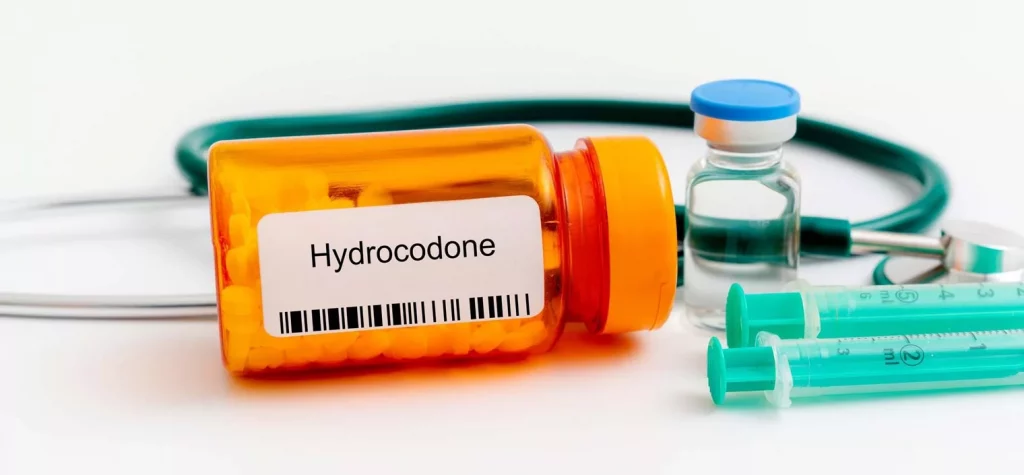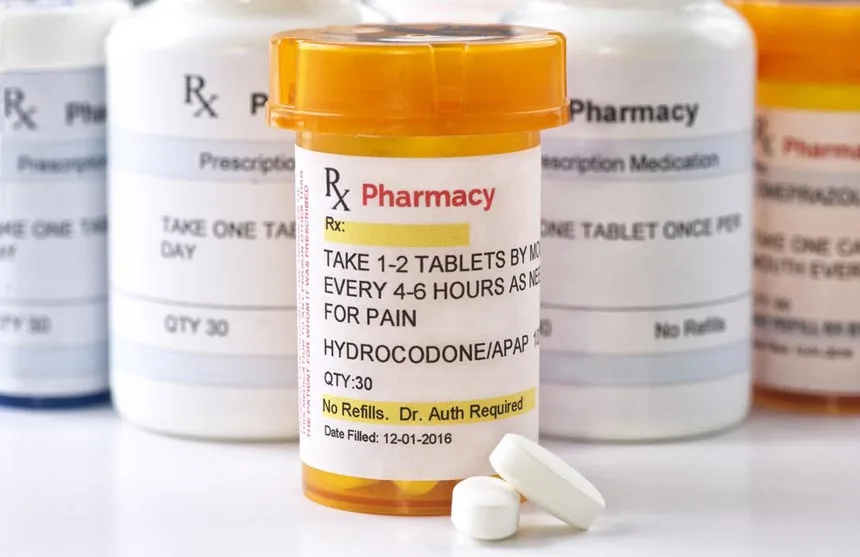Prescription painkillers like hydrocodone are misused by roughly 11.5 million people in the U.S., where an estimated 2.1 million people also suffer from painkiller addiction. Hydrocodone and other opioids are highly addictive and can be difficult to stop using due to the way these drugs change the brain to cause physical and psychological dependence.
Fortunately, there are many hydrocodone addiction treatment options that can guide you or your loved one safely through withdrawal and recovery while facing a lowered risk for discomfort and potential complications.
Keep reading to find out all about hydrocodone dependence, withdrawal, and how to find effective treatment options!
What is Hydrocodone?
Table of Contents
- What is Hydrocodone?
- How Does Hydrocodone Work?
- How Do People Become Addicted to Hydrocodone?
- What are the Effects of Long-Term Hydrocodone Use on the Body?
- What Are The Symptoms Of Hydrocodone Withdrawal?
- Is it Safe to Conduct Hydrocodone Addiction Treatment at Home?
- Hydrocodone Addiction Treatment Options
- Hydrocodone Addiction Help: Found Here!
- Medically Reviewed By
Hydrocodone is a prescription drug that comes in various forms, including tablets and liquids. It is used for the treatment of moderate to severe pain. People commonly use this prescription opioid to treat muscle aches. It also has narcotic properties and can be habit-forming.
Hydrocodone is a semi-synthetic opioid analgesic drug developed from codeine. Hydrocodone is in the same family as morphine and oxycodone, but it’s less potent than these other prescription pain medications. Hydrocodone has been used since 1916 as a cough suppressant and pain reliever, but it’s not approved for use as a cough suppressant in children under six years old.
Hydrocodone has several brand names, such as Vicodin, Lortab, Norco, Lorcet, and Zohydro ER. Hydrocodone was first approved by the FDA in 1943 as an analgesic (pain reliever) drug for moderate to severe pain. As a schedule III narcotic controlled substance, it’s only available through prescription by a doctor or dentist who can prescribe it according to your medical needs and condition.
How Does Hydrocodone Work?
The drug works by attaching itself to molecules in your brain called opioid receptors, which are designed to receive certain chemicals that act on the nervous system and cause pain relief. Hydrocodone blocks these receptors and prevents them from receiving those chemicals, essentially blocking pain signals in the body, which ultimately reduces the body’s perception of pain.
Hydrocodone belongs to a group of medicines known as central nervous system (CNS) depressants (medicines that slow down the nervous system). The effects of hydrocodone can last for 4-6 hours after taking it orally; however, you should only take this medication if you’re experiencing short-term acute pain due to an injury or illness — not long-term chronic pain — because it can lead to physical dependence and addiction if taken over a long period of time.
How Do People Become Addicted to Hydrocodone?
Hydrocodone is an opioid drug, usually combined with acetaminophen, to treat moderate to severe pain. The drug is generally only intended for short-term use, since using the drug regularly and frequently for longer than a few weeks can lead to tolerance, dependence, and addiction. Once it has reached the stage of addiction, one can be said to be suffering from a substance use disorder.
People fall into Hydrocodone dependency for a number of reasons that may be intentional or unintentional. Some abuse hydrocodone for its euphoric effects, while others may end up engaging in Hydrocodone abuse to cope with mental health disorders like anxiety and depression. Some people are predisposed to addiction on behalf of family genetics, while those without a valid prescription for Hydrocodone may use a friend’s leftover pills to relieve pain and avoid having to visit a doctor.
All these behaviors and risk factors can cause people to abuse and develop a tolerance to Hydrocodone, which is when higher doses of the drug are needed to achieve its effects. Tolerance can quickly lead to Hydrocodone dependency, which is characterized by drug cravings and severe symptoms of withdrawal when stopping the drug abruptly. Over time, those dependent on Hydrocodone will modify their lifestyles and behaviors accordingly so they can devote more time to obtaining, using, and recovering from the effects of Hydrocodone. These behavioral changes are often signs of Hydrocodone addiction.
What are the Effects of Long-Term Hydrocodone Use on the Body?
Hydrocodone can be taken in many forms. The most common form is as an oral solution or tablet that you take by mouth. You may also be able to buy hydrocodone in other forms, such as rectal suppositories or injections, which are injected into a vein or muscle. Hydrocodone can cause side effects if you take too much of it or if you use it for too long. Long-term Hydrocodone use can cause a host of unpleasant side effects, including:
- Stomach Ulcers – Taking high doses of this drug for several weeks can cause stomach ulcers which are painful sores in your stomach lining. People who take large amounts of acetaminophen (paracetamol) for long periods of time may also be at risk for developing ulcers.
- Physical dependence – When your body builds up a tolerance to the drug, you need more of it to get the same effect. This means you’re at risk of becoming addicted and developing a habit of substance abuse.
- Withdrawal symptoms – If you suddenly stop taking Hydrocodone after using it regularly, you may experience withdrawal symptoms such as irritability, nausea, vomiting, and diarrhea. These symptoms can last for up to two weeks after you stop taking the drug.
What Are The Symptoms Of Hydrocodone Withdrawal?
Unmonitored drug use and drug abuse can lead to many problems. The truth is that substance abuse can be incredibly difficult to get past. Prescription opioids and, by extension, the epidemic of opioid addiction is objectively considered by many to be one of the more insurmountable problems we face in the modern day.
One of the biggest reasons for this is because of just how severe the withdrawal symptoms from prescription drug addiction can be. The physical symptoms themselves can be so debilitating that many choose to travel further down the spiral of substance use disorders rather than seek to enter into any treatment programs.
A variety of symptoms can be experienced during withdrawal from Hydrocodone, depending on the individual’s history of drug use and the amount of hydrocodone that has been consumed. Hydrocodone is classified as a narcotic analgesic, which means that it reduces pain by acting on certain receptors in the brain. It also works by increasing dopamine and endorphins in the brain. Once the person stops taking Hydrocodone regularly, the body begins to experience the symptoms of withdrawal.
When you stop taking hydrocodone after using it regularly for a long period of time, you may experience withdrawal symptoms. These include:
- Nausea
- Vomiting
- Sweating
- Mood swings
- Disturbed sleep patterns
- Diarrhea
- Muscle cramps
- Anxiety and irritability
Is it Safe to Conduct Hydrocodone Addiction Treatment at Home?
Some people may choose to recover from hydrocodone addiction at home for reasons such as financial hardship, lack of health insurance, and stigma. However, withdrawing from hydrocodone at home without medical supervision can be risky and dangerous, and it increases the risk for complications including relapse, dehydration, and suicidal ideation. Plus, many at-home detox kits are not approved by the FDA or proven safe for use in treating hydrocodone addiction.
Hydrocodone addiction treatment is safest when conducted in a controlled medical environment where doctors and nurses can monitor your recovery and intervene when necessary to reduce complications. Professional treatment centers can also administer medications that relieve your symptoms and give you 24/7 access to medical care, counselors, and therapists who can offer help and support at any time of day.
Hydrocodone Addiction Treatment Options
It is very possible to treat Hydrocodone addiction safely and successfully as a whole using drug detox and therapy. Drug detox helps you overcome physical dependence on Hydrocodone, while therapy treats the underlying psychological root causes of Hydrocodone addiction. Detox and therapy are available in an inpatient or outpatient setting so you can choose a treatment program that fits best with your unique lifestyle and recovery needs.
Inpatient and Outpatient Treatment Programs
You’ve reached the point of admitting that there is a problem with Hydrocodone abuse and you’re ready for help. This is great! Finding the right treatment center is the first and very important step in substance abuse treatment. You learn that there are two types of programs; inpatient and outpatient. This is what differentiates the two of them.
Inpatient rehabilitation centers are residential facilities where patients receive medical care on a 24-hour basis. Patients have access to nurses, doctors, and other medical staff around the clock. These centers offer both physical and mental care for those who need it most. Patients stay in these centers for varying lengths of time depending on their needs. Some may stay for just a few weeks, while others may stay for months at a time.
Outpatient programs are designed for people who need help with an addiction treatment plan outside of their normal daily routine. These programs usually meet once per week at a clinic or hospital where they can receive counseling and group therapy sessions from licensed professionals such as doctors, nurses, and therapists. The majority of these programs are open to anyone who has been diagnosed with an addiction disorder (including drug abuse), regardless of whether or not they have been hospitalized before or not.
Inpatient treatment is usually more effective, but it’s also more expensive and restrictive. If you can afford inpatient treatment, it may be worth it to go through a residential program so you don’t have access to drugs or alcohol during your recovery process. Also, if you live far away from an inpatient facility, it might not be convenient for you to travel back and forth each day for out-of-town appointments. In addition, some insurance companies will only cover inpatient rehab services rather than outpatient ones.
Outpatient rehab centers, on the other hand, allow patients to attend treatment during specific hours while maintaining their normal lives. This can be helpful for those who have personal or professional responsibilities that they need to attend to while in recovery.
Detox
Detox is the first stage of hydrocodone addiction treatment, and can be performed as a medical detox or with medication-assisted treatment, or MAT. Medical detox allows you to withdraw from hydrocodone under 24/7 medical supervision, while MAT allows you to use medications that relieve or eliminate Hydrocodone withdrawal symptoms so you can resume normal daily activities. Both hydrocodone detox treatments can help you or your loved one experience a safe, comfortable withdrawal and recovery.
The detoxification process starts with medically supervised withdrawal from hydrocodone, which may last up to four weeks. During this time, patients are monitored closely by medical professionals who can provide them with medication to help ease symptoms of withdrawal.
Therapy
Therapy can involve a number of clinical evidence-based therapies like cognitive-behavioral therapy, 12-step programs, and family therapy, or holistic evidence-based therapies like motivational enhancement and stress management training. All therapies can be personalized based on the unique struggles you or your loved one may face as they relate to overcoming hydrocodone addiction.
Cognitive behavioral therapy (CBT) is a type of psychotherapy that helps people learn how to change negative thoughts and behaviors. CBT teaches you how to identify harmful patterns in your thinking and actions, then challenges those patterns.
Dialectical behavior therapy (DBT) is a type of cognitive-behavioral therapy that was originally designed to treat borderline personality disorder, but has since been used for treating substance abuse disorders as well. DBT focuses on mindfulness, distress tolerance, emotional regulation, and interpersonal effectiveness skills.
Holistic therapies like acupuncture can help with the side effects of Hydrocodone withdrawal and addiction by reducing inflammation and boosting the immune system so that you feel better when taking less medication.
One of the most important aspects of holistic therapy is learning how to deal with stress and anxiety in a healthy way. This means that you need to learn how to relax, meditate, breathe deeply, and do other things that will help you relax and reduce your stress levels. When you are stressed out it makes it much harder for you to fight your addiction and stay away from hydrocodone.
Hydrocodone Addiction Help: Found Here!
If you or a loved one is struggling with hydrocodone addiction, understand you’re not alone and that there are many nearby treatment centers ready to help. Before trying to conduct hydrocodone addiction treatment at home, explore your options for affordable treatment centers that offer drug detox and therapy.
Call our 24/7 hotline to get hydrocodone addiction help and to discuss all your hydrocodone addiction treatment options with a representative.
Find Addiction Rehabs will perform an insurance verification check and help you find a nearby rehab center devoted to helping you fully and successfully recover from hydrocodone addiction.
Give yourself a break and reach out today!
Rachael Goldstein has been a freelance writer for more than 10 years, having written for Find Addiction Rehabs for the past two years. She specializes in writing about the law, mental health, psychology, and addiction. She is the owner and author of the website www.addicted-to-sobriety.com. Rachael is also a licensed attorney in the state of Pennsylvania.





